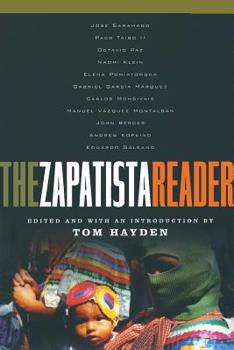The Zapatista Reader
The electrifying effect the Zapatista peasant rebellion has had on leading figures in the intellectual, political, and literary world since the Zapatistas woke them up on New Year's Day, 1994, has provided inspiration for activists all over the world. A remarkable synergy has also developed between leading writers, novelists, and journalists and Subcomandante Marcos, the enigmatic, pipe-smoking and balaclavered leader of the Zapatista Army of National Liberation, who seems like a character out of a "magical realism" novel. This reader includes a wide sampling of the best of the writing to emerge on the subject. The book is a journey through an insurgent and magical world of culture and politics, where celebrants and critics debate what Carlos Fuentes has described as the world's first 'post-communist rebellion.' Included are essays by Paco Taibo II, Octavio Paz, Carlos Fuentes, Elena Poniatowska, Ilan Stavans, Carlos Monsivais, Jorge Castenada, Jose Saramago, John Berger, Marc Cooper, Andrew Kopkind, Bill Weinberg, Gabriel Garcia Marquez, Alma Guillermoprieto and Eduardo Galeano.
Format:Paperback
Language:English
ISBN:1560253355
ISBN13:9781560253358
Release Date:January 2002
Publisher:Bold Type Books
Length:400 Pages
Weight:1.51 lbs.
Dimensions:1.1" x 6.8" x 8.4"
Customer Reviews
2 ratings
Highly Detailed And Informative
Published by Thriftbooks.com User , 18 years ago
"The Zapatista Reader" is one of the best collections of work pertaining to the Zapatista Indian uprising in the state of Chiapas, Mexico. On January 1, 1994, the Zapatista Army Of National Liberation announced itself to the world when it took over many provinces in Chiapas and declared that Mexico's Indian peoples would not live under the oppression and hunger offered by their corrupt government (January 1 is apparently a date favored by revolutionaries considering that this was also the day Fidel Castro and his rebels took Cuba). Lead by the charismatic Subcomandante Marcos, the Zapatistas have gained worldwide fame as one of the post-Cold War world's most important and relevant revolutionary movements. With "The Zapatista Reader" we get a rich palette of the ideas, politics and history behind not just the Zapatistas, but the current state of Mexico as well. Great Latin authors such as Colombia's Gabriel Garcia Marquez and Mexico's own Paco Ignacio Taibo II (author of the great Che Guevara bio "Guevara, Also Known As Che") offer their own articles and interviews with Marcos and other members of the movement. We learn that the Zapatista revolution has deeper intentions than most people realize, for example the Zapatista women wrote their own constitution demanding equal rights in education, work and marital status. There are wonderful snippets of indigenous poetry and Marcos' own writings are a powerful reflection on the decaying state of a world that has sold itself to materialism. There are fascinating historical accounts of the history of the Americas dating back to the Spanish conquest when the brutal repression of the Indian peoples began and planted the seeds for an uprising such as in Chiapas. Some of the accounts of the Mexican government's treatment of the indigenous people are strong and ugly, such as the case of Acteal where a large group of Indians were murdered in cold blood by government death squads as a response to the Zapatista revolution. "The Zapatista Reader" is highly detailed, readable and fascinating, never boring. It is a vital document on the modern history of the Americas.
Insightful and Educational
Published by Thriftbooks.com User , 22 years ago
This is a nice collection put together by Tom Hayden that serves to give one a broad overview of the Zapatista movement. There are many books out there written on the subject, none of which I have had the opportunity as of yet to read. I think the strength of the Zapatista Reader is the multi-faceted perspective it offers the reader on Marcos, the Zapatistas, the state of Chiapas, etc. Much of the well-known and respected Latin America media, as well as from around the world, weighs in with a different take on the history, culture, politics, economic theory and more. To some the book might be repetitive, as most of the authors recount a lot of the same details. However, I also believe that to be one of the book's strengths, that by the end of the reader one is well versed in the goings-on. As each author hails from a different educational and professional background, each provides different insights, pearls of wisdom if you will, just when you think there couldn't be anymore to learn. One comes away with knowing the Zapatista movement more as Mexico's version of the Civil Rights era than the next Cuban Revolution, an understanding of Mexican history, particularly as it concerns national and agrarian politics and much, much more. Though there is plenty of Marcos speak, those looking for strictly Marcos, or Marcos' words, still might be able to find better, perhaps in something like Our Word Is Our Weapon. However, if one appreciates excellent, insightful and detailed journalism, the Zapatista Reader is like reading a special edition Time, mutiplied by ten, the Zapatistas from all sides, uncensored, exposed. I recommend it.






